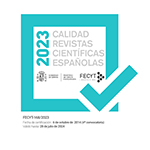Presidentialism and Recall in Latin America
Abstract
Recall is a citizen participation and control mechanism principally framed in the third wave of democratization and in the 90s Latin America`s political and constitutional reforms. It appeared between the innovations introduced by the rulers in response to the crisis of representation. Its appearance opens deep questions about: the metamorphosis of modern representation (a certain approach to the "imperative mandate"), the changes in the presidential system (relaxation, quasi-parliamentarization), new forms of presidential falls and crisis resolution, and the democratization of government (another instance of voting enabled for the removal of elected officials). In this regard, work has two objectives: conceptually analyze the recall, specifically, the presidential recall (existing only in Venezuela, Bolivia and Ecuador); and link this mechanism with the debate on Latin American presidentialism (as it is considered to produce potential changes in the presidential system), with the theory of types of constitutional succession and with the theory of presidential interruptions (since the recall is another removal device available in cases of institutional crisis). It is therefore a theoretical study that aims to conceptualize a certain type of recall and link it with other theoretical developments of which has been absent. These and other theoretical and institutional engineering implications motivate this article. It aims to elucidate the potential, direct and indirect effects of the introduction of this mechanism for Latin American presidential democracies.
Downloads
Article download
License
In order to support the global exchange of knowledge, the journal Política y Sociedad is allowing unrestricted access to its content as from its publication in this electronic edition, and as such it is an open-access journal. The originals published in this journal are the property of the Complutense University of Madrid and any reproduction thereof in full or in part must cite the source. All content is distributed under a Creative Commons Attribution 4.0 use and distribution licence (CC BY 4.0). This circumstance must be expressly stated in these terms where necessary. You can view the summary and the complete legal text of the licence.











